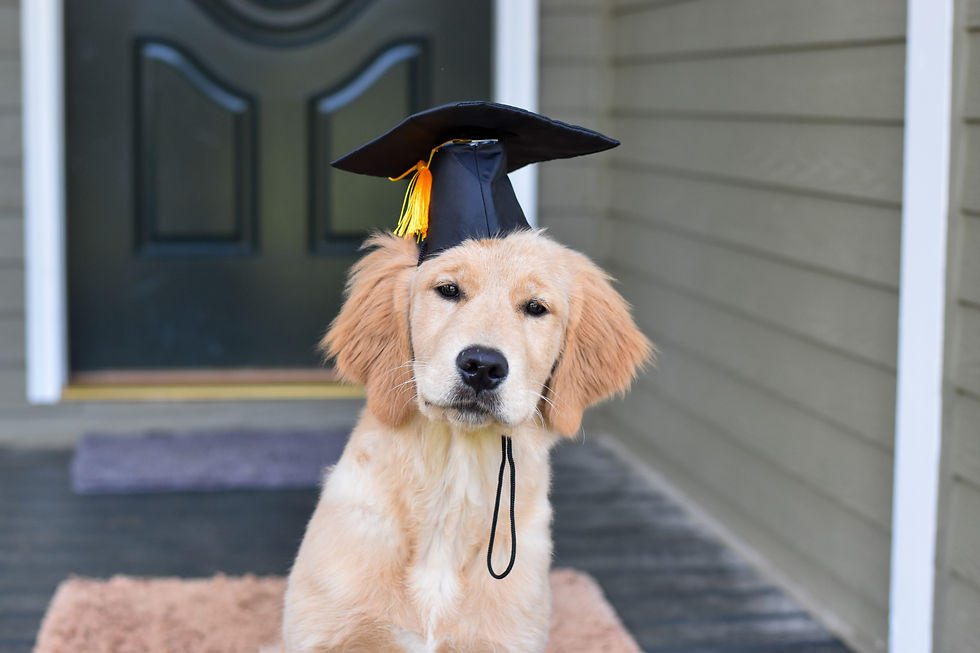What’s the Best Age to Start Puppy Training? Why 8 Weeks Is the Sweet Spot
- A Dogs Life Inc.
- Mar 1, 2025
- 3 min read
Updated: Jul 31, 2025
“When should I start training my puppy?” It’s one of the most common—and important—questions new dog owners ask. The answer? Earlier than you think.
At A Dog’s Life, we begin training at just 8 weeks old because this is when puppies are most open to learning, and developing healthy habits that last a lifetime. Starting early isn’t just beneficial, it’s critical.

Why 8 Weeks Is the Sweet Spot
Between 8 and 16 weeks, puppies go through a key developmental stage called the early socialization window. During this time, they’re learning what’s safe, what’s scary, and how the world works. This short window has a long-term impact on behavior, confidence, and trainability.
"Start at 8 weeks, and you’re shaping who they’ll become. Wait too long, and you’re correcting what they’ve already learned."
Training during this phase helps puppies become calm, well-adjusted, and confident. Waiting too long, even just a few weeks, can make it harder to undo fears, anxiety, or unwanted behaviors.
What Does Puppy Training Look Like at 8 Weeks?
At this stage, it’s not about strict obedience drills. It’s about building a foundation for life. Our training at 8 weeks focuses on:
Name recognition and engagement
Crate training and potty training
Gentle leash introduction
Socialization with sights, sounds, textures, and people
Learning calm behavior during meals, grooming, and daily routines
We teach puppies to look to humans for guidance and how to handle the world without fear or overstimulation. It’s all done in a real-home environment, not a kennel.
Why We Don’t Wait Until 16 Weeks
Most traditional obedience programs don’t start until 4 months or later. That might be convenient for trainers, but it’s not what’s best for the dog. By that time, many puppies have already learned to bark, bite, jump, or panic during new experiences.
Waiting also delays exposure to things like car rides, stairs, vacuums, leash walking, or meeting people…which leads to fear or reactivity down the road.
When we begin at 8 weeks, we prevent problems rather than correct them.
"Obedience can wait. Socialization can’t."

Long-Term Benefits of Early Puppy Training
Starting at 8 weeks helps shape the entire temperament of your dog. When puppies are raised with consistency, calm leadership, and intentional socialization, they grow up to be dogs who are:
Confident in new environments
Well-mannered around guests, kids, and strangers
Calm on leash and off
Easier to integrate into any lifestyle, whether you’re at home, traveling, or dining on a patio
It’s not about teaching tricks. It’s about raising a lifestyle-ready dog from day one.
"The work we do between 8 and 16 weeks doesn’t just change your puppy, it changes your whole experience as a dog owner."
Final Thoughts
If you want a well-behaved dog, it starts with how the puppy is raised and when. Training at 8 weeks gives your puppy the best shot at becoming calm, confident, and well-behaved for life.
And if you don’t have the time, bandwidth, or confidence to do it yourself, that’s exactly what we’re here for.
Ready to Skip the Chaos?
Apply for our luxury puppy training program and bring home a dog that’s already crate trained, potty trained, socialized, and ready for your lifestyle.
We only raise two puppies at a time in our full-time program. Every puppy is trained based on your family’s goals, home environment, and future plans.
Training starts at 8 weeks, and pickup is between 5 to 6 months of age.
Program pricing ranges from $15,500 to $28,000, depending on duration and customization.
Frequently Asked Questions
Can you start training a puppy at 8 weeks?Yes. This is actually the best time to start. It sets the tone for socialization, boundaries, and communication.
What are the benefits of early puppy training?Early training reduces problem behaviors, builds confidence, and creates a stronger bond between you and your dog.
Do trained puppies make better pets?Absolutely. Puppies raised with structure and calm handling grow into dogs who are relaxed, responsive, and easier to live with.




Comments